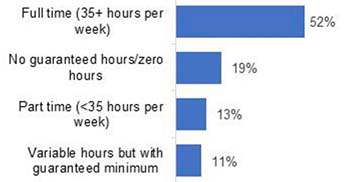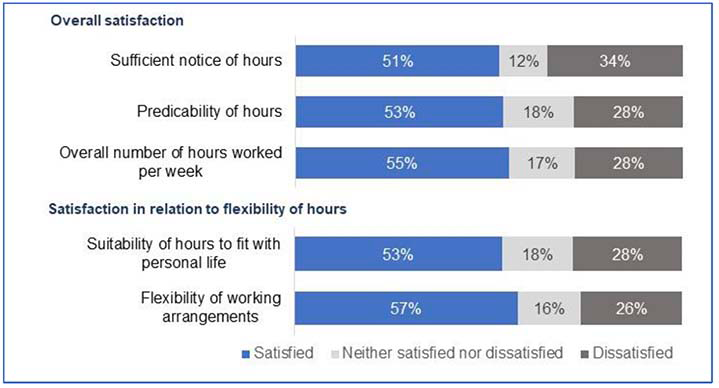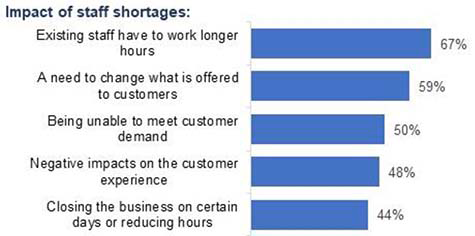Executive summary
Summary of results from survey of workers
245 hospitality workers responded to the survey between 3rd May and 9th July 2023. With this size of sample, results are accurate to around +/-6% at the 95% levels of confidence.
Contracts
- 52% of survey respondents worked on a full time basis, 24% were employed part time or had variable hours with a minimum guaranteed number of hours, and 19% had a zero-hours contract.
- 73% of workers taking part in the survey had a permanent/ open ended contract, while much smaller percentages had other types of contract (2% fixed term, 2% temporary/seasonal). However, 3% of respondents had no written contract.

Pay
- While 54% of workers stated that their pay is always stable and predictable, 43% indicated that this is not the case (40% stated that their hours vary and 9% were sometimes sent home unpaid).
- 72% of responding workers were paid at or above the Real Living Wage; (notably this level is higher than provisional 2023 Scottish Government estimates for employees in the Accommodation and Food sector as a whole (54%) (ONS Annual Survey of Hours and Earnings, 2023), which could be a reflection of a variation in the profile of those taking part in the survey with the profile of all workers in the sector).
- 84% believe they are entitled to paid holiday entitlement, and 53% would expect to receive pay if they were off sick.
Hours
- While levels of satisfaction in relation to hours and the flexibility of hours worked varied across those responding to the survey, significant minorities expressed dissatisfaction with a number of aspects.
- In general, satisfaction with hours and flexibility of hours were highest amongst those working for hotels and those who see hospitality as a career, but lower amongst those working in hospitality while studying.
- 51% of survey respondents usually work unpaid overtime with an average of around 8.5 hours overtime worked per week.

Training and development
- Although all employers are required to ensure their workers receive sufficient training to ensure their safety while at work, just 67% of hospitality workers reported having received health and safety training in the last 12 months.
- 58% had received training other than health and safety training during the last 12 months.
- 65% agreed that they had received enough training to be able to do their job well, but 30% did not think that they had received enough training.
- 31% had been required to attend training in personal time. This percentage was higher amongst:
- those working in cafés and restaurants – 43%
- those on a zero-hour contract - 44%
Relationships at work
- While relationships with co-workers were predominantly positive, more varied responses were provided regarding relationships with managers:

- 42% of workers responding to the survey personally experienced bullying or harassment at work in the last 12 months:
- - 30% from customers
- - 22% from managers
- - 13% from co-workers
- Amongst these respondents, bullying or harassment most often related to:
- Their sex – 36%
- Their age – 20%
- Their accent – 20%
- Their social class – 17%
- 42% of those who either personally experienced or witnessed bullying or harassment at work had not reported it, most often due to a lack of anyone to report instances to, or an expectation that no action would be taken.
- Furthermore, when bullying or harassment was reported, just 30% felt that the issues were dealt with effectively.
Employee voice
- 62% of workers felt that they had opportunities to have their voice and opinion listened to, but far fewer (43%) felt that their voice was taken into account in decisions.
- 46% had never challenged their employer about their rights. In 43% of these cases, they decided instead to put up with the issues they were facing, chose to leave their job, or just didn’t want to challenge their employer.
- 20% were members of a trade union.
Overall views on working in hospitality
- While 45% of responding workers would recommend working in the hospitality sector to family or friends, 37% would not and 18% are uncertain.
Summary of results from survey of businesses
79 hospitality businesses responded to the survey between 3rd May and 9th July 2023. With this size of sample, results are accurate to around +/-11% at the 95% levels of confidence.
Challenges faced
- Staff shortages are one of the most significant challenges facing hospitality businesses:
- - 81% are having difficulties recruiting staff – a major problem for 47%
- - 72% are having difficulties with high levels of staff turnover – a major problem for 24%
- The most difficult roles to recruit for include chefs, other kitchen staff, housekeeping, and bar staff.
- The most common impacts of staff shortages on hospitality businesses experiencing challenges were reported as follows:
- Existing staff having to work longer hours – 67%
- A need to change what is offered to customers – 59%
- Being unable to meet customer demand – 50%
- Negative impacts on the customer experience- 48%
- Closing the business on certain days or reducing opening hours – 44%.

Contracts
- Many businesses are using a variety of contract types:
- - 90% use permanent/ open ended contracts
- - 39% use fixed term contracts
- - 37% use zero-hour contracts
- - 25% use agency workers
- - 25% provide apprenticeships
Pay
- 44% of responding businesses stated that they are Real Living Wage employers.
- 71% stated that everyone working in their business is paid the Real Living Wage or more.
- The most common reasons given for not paying at this level include:
- levels not being affordable given rising operating costs
- some staff being aged under 18.
Hours and benefits
- 78% of businesses offer flexible arrangements, most often in the form of flexible working hours (65%).
- The majority also offer non-pay terms and conditions including:
- - 78% provide employer contributions to a pension scheme – however as this benefit is a statutory requirement, it is notable that 22% do not offer it.
- - 76% offer discounts for workers and their friends and families.
- - 62% offer subsidised meals.
Training and development
- Businesses face a number of challenges in relation to delivering training:
- - 57% find it difficult to access specific funding to support training and upskilling
- - 51% find it difficult to find training solutions affordable to their business
- - 50% find it difficult to provide staff with paid time to undertake training
- 34% of businesses expect the amount of training they arrange or fund for staff during the next 12 months to increase, but the remainder anticipate that this will not change or that levels will decrease.
Employee voice
- The majority of businesses (either regularly or occasionally) hold meetings where staff can express their views on particular issues, most often on making improvements at work (95%), health and safety issues (92%) and working hours (88%).
- 95% feel that staff can be very or fairly influential at these meetings.
- 10% currently consult with trade unions, and 15% are interested in having a closer working relationship with trade unions.
Grievances and disciplinary procedures
- 9% of businesses taking part in the survey did not have a formal procedure for dealing with grievances.
- 91% of businesses taking part in the survey have a formal procedure for dealing with discipline and dismissals other than redundancies.
- 38% stated that disciplinary action had taken place in their workplace in the past year.
Overall views on working in hospitality
- Nearly all of the businesses responding (97%) stated that they believed that their business was a good one to work for.
- When asked how the sector could be made a more attractive career choice, the most common suggestions relate to increased/fairer pay (25%), providing more flexible hours that allow a better work-life balance (17%) and improving communications with staff (15%).
- Businesses cited a number of challenges making it harder for employers who were seeking to make the industry more attractive, most notably rising costs and low profit margins (36%), concerns over the attitudes of employees (18%) and a recognition that the sector has a bad reputation (13%).
Summary of cross cutting themes
Hours
- Working hours were identified as a key issue by both businesses and workers. For businesses, issues focus around ensuring sufficient staff availability to cover the hours of work needed - 71% of businesses reported problems with staff recruitment, with the most common ‘knock on’ impact of these issues reported (67%) being that existing staff are required to work longer hours.
For workers, receiving appropriate and predictable hours were essential to support both work-life balance and an adequate standard of living. Despite this, workers responding to the survey expressed fairly negative views in relation to their working hours with only 56% satisfied with their overall number of hours, 54% satisfied with the predictability of their hours, and 53% satisfied that their working hours fitted with their personal life.
Training
- The vast majority of businesses stated that they delivered staff training, most often on the job (94%). However, possibly reflecting the commercial challenges faced by many businesses, only 53% of businesses had a budget for delivering training beyond mandatory requirements (such as health and safety) and only 1 in 3 held regular meetings with staff to discuss training plans.
The worker perspective on training was fairly negative, with only 65% of hospitality workers indicating that they felt that they had received enough training to do their job well.
Relationships and grievances
- 46% of businesses stated that any grievances had been raised in the past year. The most common grievances related to pay/ terms & conditions, unfair treatment/relationships with line managers and bullying or harassment at work.
This resonates with the workers survey where 17% of workers responding rated their relationship with managers as entirely or mainly negative, and 22% of employees stated that they had experienced bullying or harassment from managers.
Employee voice
- Businesses responding to the survey had a largely positive perspective on levels of engagement with employees with 68% stating that they regularly hold meetings with staff where they can express their views.
However, just 42% of workers believe their voice is taken into account in management decisions.
Conclusion
The high percentage of Real Living Wage employers and workers who receive the Real Living Wage in the sample suggests a potential positive skew in results. Despite this, it is important to recognise that over half of workers surveyed (60%) would recommend their employer, and 45% would recommend the overall sector as a place to work.
Positive feedback was provided by many workers in relation to key areas related to fair work. For example, 65% felt that they had received sufficient training to do their job well, 54% stated that pay was always stable and predictable, 56% were satisfied with their hours, and 54% were satisfied with their work/life balance.
These findings also suggest, however, that for many workers experiences of working in the hospitality sector are less positive, with issues raised around flexibility and predictability of hours, fairness in pay, insufficient training, poor relationships with managers, and challenges around communications and voice mechanisms.
Experiences of poor practice are more frequently reported amongst certain groups of workers including women, younger people, people with a long-term health condition or disability, and those working in hospitality to earn extra money or while studying.
While it is undoubtably a challenging time for hospitality businesses, there is still scope to make progress and a focus on improving access to basic rights, particularly stable and predictable hours, could support better outcomes for workers and employers in the industry.